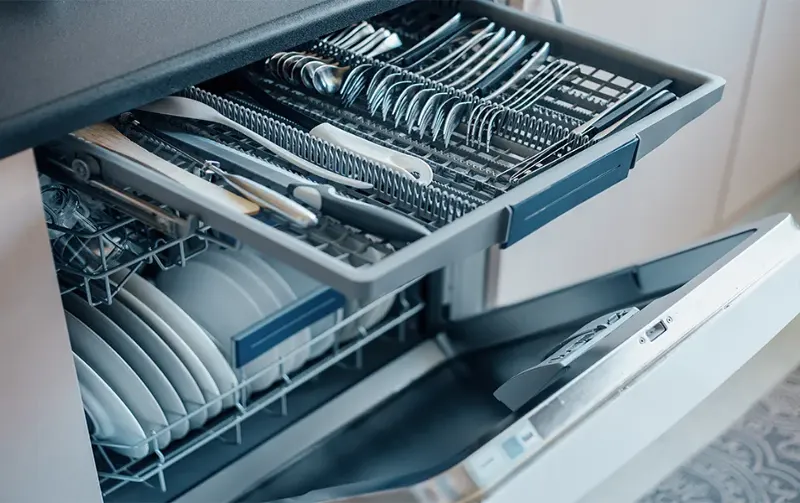Most residential dishwashers in the United States operate on a standard 110-120 volt outlet. They typically require a dedicated 15-20 amp circuit due to their power consumption.
Dishwashers are an essential component of modern kitchens, streamlining the chore of washing dishes and improving hygiene.
Their design to work on 110-120V allows easy integration into existing kitchen electrical systems, avoiding the need for special wiring that a 220-240V appliance would necessitate.
The standard voltage for household appliances makes the choice of adding a dishwasher more convenient for homeowners, ensuring compatibility with the electrical infrastructure of most homes.
By meeting the demands for energy efficiency and convenience, modern dishwashers continue to be a favorable choice for those looking to save time and reduce effort in their daily routines.

Dishwasher Voltage Explained
Dishwasher voltage requirements are a crucial aspect to consider before purchasing and installing a new appliance.
Typically, a standard home dishwasher is designed to operate on a 110-120-volt, 60 Hz electrical circuit, which aligns with the majority of residential electrical systems.
It’s essential for homeowners to ensure that their electrical infrastructure supports this voltage level.
The significance of voltage compatibility in dishwashers cannot be overstated; it affects the machine’s efficiency and safety.
A mismatch in voltage can lead to suboptimal performance, potential hazards, or even damage to the dishwasher.
In the US, most dishwashers are designed for 110-volt outlets, which allows for easy integration into existing kitchen circuits without needing special wiring or a dedicated 220-volt circuit.
110-volt Dishwashers: Pros And Cons
110-volt dishwashers are commonly praised for their ease of installation, requiring only a standard electrical outlet.
The energy efficiency is also a key benefit, as they consume less power compared to their 220-volt counterparts.
Homeowners appreciate the lower upfront cost and the fact that these appliances often fit within most kitchen designs without requiring additional wiring.
The primary concern with 110-volt dishwashers lies in their limited performance capabilities.
They typically have longer cycle times and may not heat water as efficiently as 220-volt models, which can affect cleaning effectiveness.
Users with larger households or those who need to run the dishwasher frequently may find the operational constraints of 110-volt dishwashers to be a significant drawback.
220-volt Dishwashers: What You Need To Know
Understanding the electrical requirements for kitchen appliances is crucial, especially for items like dishwashers.
Most households assume a standard 110-volt electrical outlet will suffice, but some dishwashers require a 220-volt connection to operate efficiently.
The powerful performance and increased efficiency of 220-volt dishwashers make them an attractive option.
They can heat water faster, which can lead to shorter cycle times and enhanced cleaning.
Additionally, they often support higher-wattage heating elements for improved drying performance, making them a robust choice for those seeking a high-end home dishwashing solution.
| Feature | Benefit |
|---|---|
| Faster Water Heating | Reduces Wash Cycle Duration |
| Higher Wattage Heating Elements | Improves Drying Efficiency |
Before installation, it is essential to check your home’s electrical capacity.
A qualified electrician can ensure the existing setup abides by safety standards and can handle the increased electrical load.
It’s vital to ensure that your home is capable of supporting a 220-volt dishwasher without overloading the system, thus avoiding potential hazards.
Frequently Asked Questions On Are Dishwashers 110 Or 220
Do Dishwashers Require 220v Outlets?
Most dishwashers in the U. S. are designed to run on 110V to 120V electrical outlets.
What Electrical Voltage Do Dishwashers Use?
Standard household dishwashers typically use a 110V to 120V electrical connection.
Can Dishwashers Work On 220v Circuits?
Dishwashers in the U. S. generally do not require 220V and are usually not compatible with these circuits without an adapter.
Is Wiring For A Dishwasher 110 Or 220?
Dishwasher wiring in North America is typically 110 to 120 volts, complying with standard residential electrical systems.
Conclusion
Understanding your dishwasher’s voltage is essential for safety and optimal functionality.
Most models require a 110-120 volt connection, easily supported by standard home outlets.
Rarely, some powerful units may need 220 volts. Always check the manufacturer’s specifications for accurate installation requirements.
Proper knowledge ensures a safe and energy-efficient kitchen environment.
